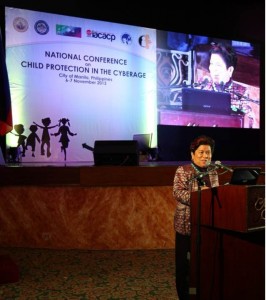
“We have to ensure more stringent implementation of our laws to protect the vulnerable women and children from the dangers of cyber child pornography and prostitution.”
This was the message of Department of Social Welfare and Development (DSWD) Secretary Corazon Juliano-Soliman to the participants of the National Conference on “Protecting Children in the Cyberage” held at the Manila Hotel today until tomorrow, November 7.
The two-day conference is led by the Department of Justice, in partnership with the Inter-Agency Council Against Trafficking (IACAT), Council for the Welfare of Children (CWC), Juvenile Justice and Welfare Council (JJWC), and the Inter-Agency Council Against Child Pornography (IACACP).
The conference aims to create a higher level of awareness among target audiences on general child protection issues, appreciate and discuss the benefits and risks of cyber age on children including the possibility of being victimized by so called online predators, define the ideal cyberspace that is safe and protective of children’s rights, and identify possible ways of protecting children from online offenses and aggressions.
Likewise, it seeks to establish a system of partnerships and cooperation that will meaningfully engage various stakeholders in the areas of prevention, protection and prosecution, and take up the issue of “Children In the Cyber Age” to the National Convergence of Committees on Children on Various Child Protection Issues for strategic follow up actions.
Secretary Soliman highlighted the various Philippine legislations to ensure that the rights of children are upheld and their welfare is promoted. These include the Act Defining Cyber Crime, Anti-Child Pornography Act, Anti-Trafficking in Persons Act, and the Child and Youth Welfare Code.
“There are also several government programs that are both preventive and restorative, and I think most importantly provide justice for those being victimized. These efforts are something that you can go through the details and improve,” Secretary Soliman challenged.
The Secretary expounded that the cyberspace is an important tool in sharing important information and making it immediately available but it can also be a source of serious threats to children’s safety and protection. Unsuspecting children fall victims to different forms of abuse by on-line predators, usually disguised as “virtual friends” or “virtual mentors.”
“The challenge is for us to be creative using precisely the same medium to protect the children and inform the parents on the evils of child pornography,” Secretary Soliman stressed.
Moreover, Secretary Soliman mentioned that through DSWD’s Pantawid Pamilyang Pilipino Program, specifically the Family Development Sessions (FDS), parent-beneficiaries are taught responsible parenthood and values which they can pass on to their children.
Pantawid Pamilya keeps the children in school and healthy so that they will not end up in the streets or be potential victims of trafficking,” Secretary Soliman said.
To date, Pantawid Pamilya benefits 3.94 million families and 8.92 million children.
Meanwhile Secretary Soliman cited the latest issue on “Sweetie,” the virtual 10-year old Filipina used by a group of child advocates to unmask over 1,000 pedophiles around the world, as alarming.
“This is a wake-up call for all of us that there is a great demand for Filipina girls in cyber pornography. We should strengthen enforcement of laws, and parents must be responsible in monitoring their children’s cyber activities,” Secretary Soliman ended. ###


